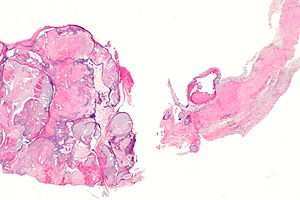Difference between revisions of "Calcific aortic stenosis"
Jump to navigation
Jump to search
| (One intermediate revision by the same user not shown) | |||
| Line 102: | Line 102: | ||
*[[Heart valves]]. | *[[Heart valves]]. | ||
*[[Atherosclerosis]]. | *[[Atherosclerosis]]. | ||
*[[Congestive heart failure]]. | |||
==References== | ==References== | ||
{{Reflist|2}} | {{Reflist|2}} | ||
[[Category:Diagnosis]] | [[Category:Diagnosis]] | ||
[[Category:Cardiovascular pathology]] | |||
Latest revision as of 19:47, 15 November 2015
| Calcific aortic stenosis | |
|---|---|
| Diagnosis in short | |
 Aortic valve stenosis. H&E stain. | |
| LM DDx | infective endocarditis (may be a concurrent pathology), bicuspid aortic valve,rheumatic heart disease |
| Gross | thickened calcified valve |
| Site | aortic valve - see heart valves |
|
| |
| Syndromes | bicuspid aortic valve if in younger individuals (50s) |
|
| |
| Signs | syncope |
| Symptoms | dyspnea (usu. first symptom), angina |
| Prevalence | common |
| Radiology | thickened valve, reduced flow area, usu. no vegetation |
| Clin. DDx | infective endocarditis, bicuspid aortic valve, rheumatic heart disease |
| Treatment | valve replacement |
Calcific aortic stenosis, abbreviated CAS, is a very common disease of the aortic valve. It typically afflicts the elderly.
In younger individuals the valve is typically abnormal (bicuspid aortic valve or unicuspid aortic valve).
General
- Somewhat similar to atherosclerosis; however, considered a separate entity.[1]
- Mitral valve is usually normal.
- Most common cause of aortic stenosis.
DDx of aortic stenosis:
- Calcific aortic stenosis.
- Bicuspid aortic valve with calcific aortic stenosis.
- Rheumatic heart disease.
Clinical (mnemonic SAD):
- Syncope.
- Angina.
- Dyspnea (shortness of breath) - first symptom.
Gross
- Thickened, calcific appearing valve.
Drop test:
- Makes a "ting" sound when landing on a metal surface.
Microscopic
Features:[2]
- Dystrophic calcification[3] - affects the valsalva side of the valve.
- It affects the fibrosa.
- Primarily at the base of the valve, i.e. there is relative sparing the free edge.
Note:
- There should be no neutrophils and no microorganisms.
- An expanded spongiosa layer may be seen in the context of calcification.[citation needed]
DDx:
- Infective endocarditis - inflammatory cells (esp. neutrophils), microorganisms (e.g. cocci).
- Bicuspid aortic valve.
- Rheumatic heart disease.
Images
Sign out
AORTIC VALVE, VALVE REPLACEMENT: - CALCIFIC AORTIC STENOSIS.
Micro
The sections show valve tissue with marked calcification of the fibrosa layer. No neutrophils are identified. No microorganisms are identified with routine stains.
See also
References
- ↑ Otto CM (September 2008). "Calcific aortic stenosis--time to look more closely at the valve". N. Engl. J. Med. 359 (13): 1395-8. doi:10.1056/NEJMe0807001. PMID 18815402.
- ↑ Cotran, Ramzi S.; Kumar, Vinay; Fausto, Nelson; Nelso Fausto; Robbins, Stanley L.; Abbas, Abul K. (2005). Robbins and Cotran pathologic basis of disease (7th ed.). St. Louis, Mo: Elsevier Saunders. pp. 590. ISBN 0-7216-0187-1.
- ↑ Novaro, GM.; Griffin, BP. (May 2003). "Calcific aortic stenosis: another face of atherosclerosis?". Cleve Clin J Med 70 (5): 471-7. PMID 12779138.












